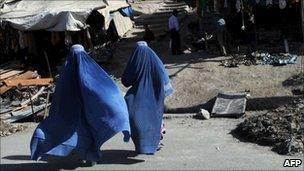Afghan women's rights under threat, say UK charities
- Published

Action Aid said there was still a lot of work to be done to improve women's lives in Afghanistan
Women's rights in Afghanistan are under threat after 10 years of progress, two leading British aid agencies have said.
Oxfam and Action Aid said many Afghan women were worried that improvements could be sacrificed to secure a political deal with the Taliban.
An Action Aid survey of 1,000 Afghan women found that 86% were worried about a return to a Taliban-style government.
The UK government said it was working hard to support Afghan women's empowerment "through transition".
Felt safer
Action Aid said many women were still denied basic rights.
The charity found that 72% of those surveyed felt that things had improved for them since the start of the war in Afghanistan in 2001.
But 37% feared their country would become a worse place following the departure of international troops.
Two-thirds of Afghan women said they felt safer now than they did 10 years ago.
Action Aid said that under Taliban rule women and girls had not been allowed to go to work or school, access to healthcare had been difficult and they had not been able to leave their houses without a male relative.
The charity said progress had been made in the past decade but added that there was still a lot more to be done to improve women's lives.
An Action Aid report said: "Women are free to be educated and to work. They serve as government ministers and MPs and work as doctors, teachers, professors, entrepreneurs and lawyers.
"These are significant achievements. However, huge challenges remain, with many women still denied basic rights.
"Action Aid believes that including women in the peace, reconciliation and transition processes is the best means of safeguarding and furthering women's hard-won civil freedoms and human rights."
The survey commissioned by Action Aid polled women in the provinces of Kabul, Balkh, Kandahar, Herat and Bamiyan.
BBC diplomatic correspondent Bridget Kendall said that 10 years ago, improving the rights of women in Afghanistan was seen as one of the goals of outside intervention.
'Encouraging results'
Oxfam and Action Aid said there had been real progress in girls' education and with better health care, more women in work and a new constitution that enshrined equal rights for women.
But the charities warned that these fragile advances were already under threat from worsening security in Afghanistan and a resurgent Taliban.
Both organisations are using the 10-year anniversary to appeal to the British government to make sure that women's rights do not end up traded away in any future peace deal with the Taliban.
International Development Secretary Andrew Mitchell said the survey results were "hugely encouraging".
"However, women and girls in Afghanistan continue to face enormous challenges, and we recognise that there is still a lot to do.
"That is why the British government is working hard to support Afghan women's empowerment as we move through transition and beyond, focusing on areas where we can influence change such as education, economic opportunities, women's participation in public life and rights, justice and the rule of law."
- Published15 June 2011
- Published1 April 2011